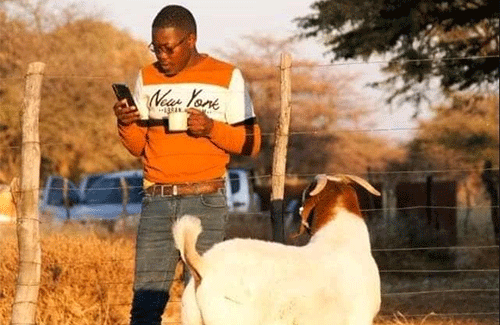Constant information sharing sessions are important for young and established farmers, as it sheds more light on how they should navigate through the livestock sector.
This is something Tjipekapora Hijangoro has been advocating for.
The 32-year-old small livestock farmer said attending lecturers should be the priority of every farmer to get more perceptive.
He is the owner of Ouua Boerbok Stud, operating in the Otjombinde constituency of the Omaheke region.
“Acquire knowledge before venturing into farming and specialising in a specific breed. You must take into consideration the growth of that breed, its fertility and even the bloodline of that animal,” he shared during a recent farmer’s information day at Okahandja.
Hijangoro added that farmers should also have their animals registered, and invest in understanding the art of breeding with small stock.
“Let’s take a look at the sheep breeds. The Damara breed is into vegetation, it will seek grazing very far. The Dorper sheep likes eating, it can eat for days. The Meatmaster won’t weigh much. They walk in a flock, is not too meaty, and that’s why I chose that,” he stated.
The small livestock connoisseur is a forester (GIS & EO) in the forest monitoring and mapping division of the tourism ministry.
He added: “A ram should look rough and a ewe should appear feminine with a wedge body shape. Never compromise on the ram you are using in your flock.”
Challenges common in the sector include infrastructure, diseases, predators, land and rangeland management.
According to Hijangoro, deworming and external parricides, vaccination (pulpy kidney and pasteurella), flush feeding, lambing and kidding, rainy season (foot rot, orf and ticks), seasonal mating and weaning are things farmers should take seriously.
“Another issue notable in our farming styles is the way animals are kept; presentation and preparing are very important, especially if one is planning on selling. If your animals are not well fed, it will show,” he stated.
The Meat Board of Namibia states that livestock producers have several responsibilities and obligations to legally own, keep, rear and market livestock.
“Animal welfare standards are prescribed in the Farm-Assured Namibian (FAN) Meat standards, of which each producer must have a copy. The standards are based on the five freedoms and apply to every aspect of livestock keeping, rearing, handling, transporting and slaughtering. These are freedom from hunger and thirst, discomfort, pain, injury or disease, fear and distress,” reads a booklet by the board.
These and many other pieces of information that Hijangoro is encouraging every farmer to be aware of while in pursuit of the agri-business endeavour, highlighting the importance of farmers having the right to legally own animals.


